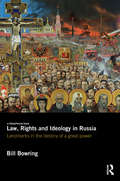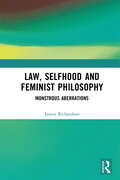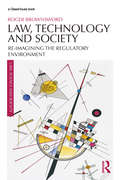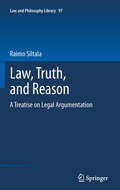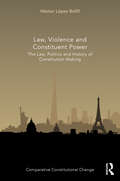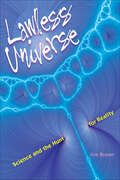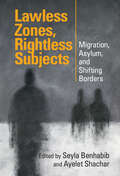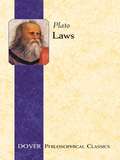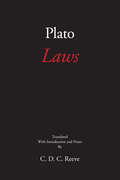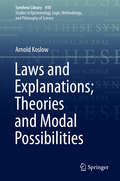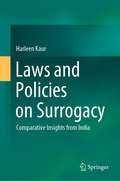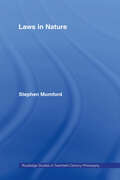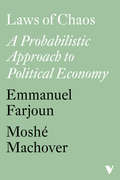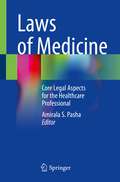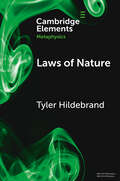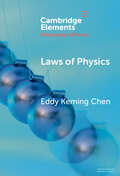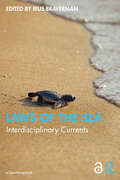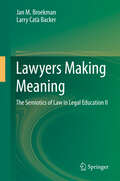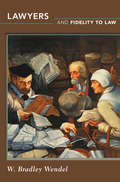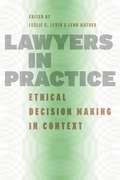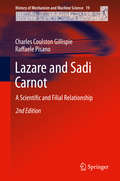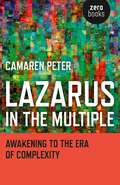- Table View
- List View
Law, Rights and Ideology in Russia: Landmarks in the Destiny of a Great Power
by Bill BowringLaw, Rights and Ideology in Russia: Landmarks in the destiny of a great power brings into sharp focus several key episodes in Russia’s vividly ideological engagement with law and rights. Drawing on 30 years of experience of consultancy and teaching in many regions of Russia and on library research in Russian-language texts, Bill Bowring provides unique insights into people, events and ideas. The book starts with the surprising role of the Scottish Enlightenment in the origins of law as an academic discipline in Russia in the eighteenth century. The Great Reforms of Tsar Aleksandr II, abolishing serfdom in 1861 and introducing jury trial in 1864, are then examined and debated as genuine reforms or the response to a revolutionary situation. A new interpretation of the life and work of the Soviet legal theorist Yevgeniy Pashukanis leads to an analysis of the conflicted attitude of the USSR to international law and human rights, especially the right of peoples to self-determination. The complex history of autonomy in Tsarist and Soviet Russia is considered, alongside the collapse of the USSR in 1991. An examination of Russia’s plunge into the European human rights system under Yeltsin is followed by the history of the death penalty in Russia. Finally, the secrets of the ideology of ‘sovereignty’ in the Putin era and their impact on law and rights are revealed. Throughout, the constant theme is the centuries long hegemonic struggle between Westernisers and Slavophiles, against the backdrop of the Messianism that proclaimed Russia to be the Third Rome, was revived in the mission of Soviet Russia to change the world and which has echoes in contemporary Eurasianism and the ideology of sovereignty.
Law, Selfhood and Feminist Philosophy: Monstrous Aberrations
by Janice RichardsonAt the intersection of law, feminism and philosophy, this book analyses the ways in which certain bodies and ‘selves’ continue to be treated as monstrous aberrations from the ‘ideal’ figure or norm. Employing contemporary feminist philosophy to rethink accepted legal ideas, the book is divided into three sections. The first focuses on the different relational ontologies of philosophers Adriana Cavarero and Christine Battersby – also considering their work via a third term: Spinoza. The second turns to diverse feminist engagements with the social contract theorists. The third section employs insights from throughout the book to focus more explicitly on law – and, in particular privacy law and the so-called ‘wrongful birth’ cases. Bringing together more than twenty years of sustained reflection, this book offers an insightful account of how contemporary feminist philosophy can contribute to a richer understanding of law. It will be of enormous interest to scholars and students working in the areas of legal theory, feminist thought and philosophy.
Law, Technology and Society: Reimagining the Regulatory Environment (Law, Science and Society)
by Roger BrownswordThis book considers the implications of the regulatory burden being borne increasingly by technological management rather than by rules of law. If crime is controlled, if human health and safety are secured, if the environment is protected, not by rules but by measures of technological management—designed into products, processes, places and so on—what should we make of this transformation? In an era of smart regulatory technologies, how should we understand the ‘regulatory environment’, and the ‘complexion’ of its regulatory signals? How does technological management sit with the Rule of Law and with the traditional ideals of legality, legal coherence, and respect for liberty, human rights and human dignity? What is the future for the rules of criminal law, torts and contract law—are they likely to be rendered redundant? How are human informational interests to be specified and protected? Can traditional rules of law survive not only the emergent use of technological management but also a risk management mentality that pervades the collective engagement with new technologies? Even if technological management is effective, is it acceptable? Are we ready for rule by technology? Undertaking a radical examination of the disruptive effects of technology on the law and the legal mind-set, Roger Brownsword calls for a triple act of re-imagination: first, re-imagining legal rules as one element of a larger regulatory environment of which technological management is also a part; secondly, re-imagining the Rule of Law as a constraint on the arbitrary exercise of power (whether exercised through rules or through technological measures); and, thirdly, re-imagining the future of traditional rules of criminal law, tort law, and contract law.
Law, Truth, and Reason
by Raimo SiltalaThis book is an innovative contribution to analytical jurisprudence. It is mainly based on the distinct premises of linguistic philosophy and Carnapian semantics, but also addresses the issues of institutional philosophy, social pragmatism, and legal principles as envisioned by Dworkin, among others. Wróblewski´s three ideologies (bound/free/legal and rational) and Makkonen´s three situations (isomorphic/semantically vague/normative gap) of judicial decision-making are further developed by means of 10 frames of legal analysis as discerned by the author. With the philosophical theories of truth serving as a reference, the frames of legal analysis include the isomorphic theory of law (Wittgenstein, Makkonen), the coherence theory of law (Alexy, Peczenik, Dworkin), the new rhetoric and legal argumentation theory (Perelman, Aarnio), social consequentialism (Posner), natural law theory (Fuller, Finnis), and the sequential model of legal reasoning by Neil MacCormick and the Bielefelder Kreis. At the end, some key issues of legal metaphysics are addressed, like the notion of legal systematics and the future potential of the analytical approach in jurisprudence.
Law, Violence and Constituent Power: The Law, Politics And History Of Constitution Making (Comparative Constitutional Change)
by Héctor López BofillThis book challenges traditional theories of constitution-making to advance an alternative view of constitutions as being founded on power which rests on violence. The work argues that rather than the idea of a constitution being the result of political participation and deliberation, all power instead is based on violence. Hence the creation of a constitution is actually an act of coercion, where, through violence, one social group is able to impose itself over others. The book advocates that the presence of violence be used as an assessment of whether genuine constitutional transformation has taken place, and that the legitimacy of a constitutional order should be dependent upon the absence of killing. The book will be essential reading for academics and researchers working in the areas of constitutional law and politics, legal and political theory, and constitutional history.
Lawless Universe: Science and the Hunt for Reality
by Joe RosenCan science fully comprehend the whole of the material universe? Not according to Joe Rosen.There is no question that advancements in science—especially in physics—have radically changed our concept of nature, revolutionizing our view of the universe, even of reality itself. Rosen argues, though, that the material universe in its entirety lies beyond science. Anyone who claims otherwise, who proposes a scientific Theory of Everything to explain all aspects and phenomena of nature, only misleads and misinforms. Taking science—and the scientific method—down a peg, Rosen asserts that any understanding of the whole universe, if it is to be found at all, can come only from outside science, from nonscientific modes of comprehension and insight. He believes that popularizers of science—think Stephen Hawking and Richard Dawkins—are mistaken when they declare that science is on the verge of unlocking all the secrets of the universe. Perhaps without realizing it, they have crossed into the realm of metaphysics in an attempt to explain the unexplainable. In Lawless Universe Rosen explores just how far science can go in comprehending nature. He considers the separate—but entangled—domains of science and metaphysics and examines the all-too-often ignored boundary between the objective and the subjective. Thought-provoking and controversial, Lawless Universe is a complement to, even an antidote for, books that create the misimpression that science can explain everything.
Lawless Universe: Science and the Hunt for Reality
by Joe RosenIn this provocative reassessment of science, a physicist questions whether it can ever fully comprehend the entire material universe.There is no question that modern science has radically advanced our understanding of nature, the universe, and even reality itself. But in Lawless Universe, theoretical physicist Joe Rosen takes the scientific method down a peg. In his estimation, people like Stephen Hawking and Richard Dawkins are wrong to declare that science is on the verge of unlocking all the secrets of the universe. Perhaps without realizing it, they have crossed into the realm of metaphysics in an attempt to explain the unexplainable. Rosen considers the separate but entangled domains of science and metaphysics and examines the all-too-often ignored boundary between the objective and the subjective. He asserts that any understanding of the whole universe, if it is to be found at all, must come from nonscientific modes of comprehension and insight.
Lawless Zones, Rightless Subjects: Migration, Asylum, and Shifting Borders
by Seyla Benhabib Ayelet ShacharResponding to ever-increasing pressures of migration, states, supranational, and subnational actors deploy complex moves and maneuvers to reconfigure borders, rights, and territory, giving rise to a changing legal cartography of international relations and international law. The purpose of this volume is to study this new reconfiguration of rights, territoriality, and jurisdiction at the empirical and normative levels and to examine its implications for the future of democratic governance within and across borders. Written by a diverse and accomplished group of scholars, the chapters in this volume employ legal, historical, philosophical, critical, discursive, and postcolonial perspectives to explore how the territoriality of the modern states – ostensibly, the most stable and unquestionable element undergirding the current international system – has been rewritten and dramatically reimagined. This title is also available as Open Access on Cambridge Core.
Laws
by Plato Benjamin JowettA lively dialogue between a foreign philosopher and a powerful statesman, Plato's Laws reflects the essence of the philosopher's reasoning on political theory and practice. It also embodies his mature and more practical ideas about a utopian republic. Plato's discourse ranges from everyday issues of criminal and matrimonial law to wider considerations involving the existence of the gods, the nature of the soul, and the problem of evil. This translation of Plato's Laws by the distinguished scholar Benjamin Jowett is an authoritative choice for students of philosophy, political science, and literature. It is included among Dover Publications' Philosophical Classics, a series that comprises the major works of ancient and modern world philosophy. Low-priced, high-quality, and unabridged, these editions are ideal for teachers and students as well as for general readers.
Laws (Hackett Classics)
by Plato"This is a superb new translation that is remarkably accurate to Plato's very difficult Greek, yet clear and highly readable. The notes are more helpful than those in any other available translation of the Laws since they contain both the information needed by the beginning student as well as analytical notes that include references to the secondary literature for the more advanced reader. For either the beginner or the scholar, this should be the preferred translation."—Christopher Bobonich, Clarence Irving Lewis Professor of Philosophy, Stanford University
Laws and Explanations; Theories and Modal Possibilities (Synthese Library #410)
by Arnold KoslowThe book has two parts: In the first, after a review of some seminal classical accounts of laws and explanations, a new account is proposed for distinguishing between laws and accidental generalizations (LAG). Among the new consequences of this proposal it is proved that any explanation of a contingent generalization shows that the generalization is not accidental. The second part involves physical theories, their modality, and their explanatory power. In particular, it is shown that (1) Each theory has a theoretical implication structure associated with it, such that there are new physical modal operators on these structures and also special modal entities that are in these structures. A special subset of the physical modals, the nomic modals are associated with the laws of theories. (2) The familiar idea that theories always explain laws by deduction of them has to be seriously modified in light of the fact that there are a host of physical theories (including for example, Newtonian Classical mechanics, Hamiltonian, and Lagrangian theory, and probability theory) that we believe are schematic (they do not have any truth value). Nevertheless, we think that there is a kind of non-deductive explanation and generality that they achieve by subsumtion under a schema.
Laws and Policies on Surrogacy: Comparative Insights from India
by Harleen KaurThis book is an essential guide on surrogacy, discussing various legal issues that arise in surrogacy cases. It provides a comprehensive coverage to various issues pertaining to surrogacy arrangements due to failure to meet the needs of those involved in surrogacy, be it the intended parents or the surrogate mother, with special emphasis on the most vulnerable party -- the surrogate child. In the wake of this existing imbalance, the call to reform the practice of surrogacy has also increased. The book provides a comprehensive coverage to various laws and policy regulations in existence dealing with surrogacy, and unravels the latest trends and developments happening around the world as surrogacy gains importance. The international perspectives highlight policies and practices being adopted and followed by various nations with regard to surrogacy regulation and associated parenthood rules. This book also analyses some of the significant cross-border disputes revolving around surrogacy, and explores briefly the jurisprudence of the European Court of Human Rights on matters of parentage and citizenship for children born of trans-national surrogacy with special reference to the prospects of a convention on international surrogacy currently being studied by The Hague Conference on Private International Law. Further, it highlights the issues and questions relating to surrogacy arrangements that are so far unresolved and unanswered and suggests measures for improvements to the existing proposed surrogacy legislation in India and need for uniform international regulation. The book is a great resource for legal practitioners, academics, students, policy-makers, infertility clinics, and charitable organizations working on this issue.
Laws in Nature (Routledge Studies in Twentieth-Century Philosophy #Vol. 18)
by Stephen MumfordMumford outlines a major new theory of natural laws. His book begins with the question of whether there are any genuinely law-like phenomena in nature. The discussion addresses questions currently being debated by metaphysicians such as whether the laws of nature are necessary or contingent and whether a property can be identified independently of its causal role.
Laws of Chaos: A Probabilistic Approach To Political Economy
by Moshé Machover Emmanuel FarjounClassic work of political economicsA defining work of Econophysics, and republished for the first time since 1983, Laws of Chaos is an attempt to construct a non-deterministic theoretical framework for the foundations of political economy. It relies on probabilistic and statistical methods of the kind used in the modern foundations of several other sciences, introducing scientific modelling into economics for the first time.
Laws of Medicine: Core Legal Aspects for the Healthcare Professional
by Amirala S. PashaThis book provides an overview of the US laws that affect clinical practice for healthcare professionals with no legal background.Divided into thirteen sections, each chapter starts with a summary of the chapter’s content and relevant legal concepts in bullet points before discussing the topics in detail. An application section is provided in many chapters to clarify essential issues by reflecting on clinically relevant case law or clinical vignette(s). Filling a crucial gap in the literature, this comprehensive guide gives healthcare professionals an understanding or a starting point to legal aspects of healthcare.
Laws of Nature (Elements in Metaphysics)
by Tyler HildebrandThis Element provides an opinionated introduction to the metaphysics of laws of nature. The first section distinguishes between scientific and philosophical questions about laws and describes some criteria for a philosophical account of laws. Subsequent sections explore the leading philosophical theories in detail, reviewing the most influential arguments in the literature. The final few sections assess the state of the field and suggest avenues for future research.
Laws of Physics (Elements in the Philosophy of Physics)
by Eddy Keming ChenDespite its apparent complexity, our world seems to be governed by simple laws of physics. This volume provides a philosophical introduction to such laws. I explain how they are connected to some of the central issues in philosophy, such as ontology, possibility, explanation, induction, counterfactuals, time, determinism, and fundamentality. I suggest that laws are fundamental facts that govern the world by constraining its physical possibilities. I examine three hallmarks of laws-simplicity, exactness, and objectivity-and discuss whether and how they may be associated with laws of physics.
Laws of the Sea: Interdisciplinary Currents
by Irus BravermanLaws of the Sea assembles scholars from law, geography, anthropology, and environmental humanities to consider the possibilities of a critical ocean approach in legal studies. Unlike the United Nations’ monumental Convention on the Law of the Sea, which imagines one comprehensive constitutional framework for governing the ocean, Laws of the Sea approaches oceanic law in plural and dynamic ways. Critically engaging contemporary concerns about the fate of the ocean, the collection’s twelve chapters range from hydrothermal vents through the continental shelf and marine genetic resources to coastal communities in France, Sweden, Florida, and Indonesia. Documenting the longstanding binary of land and sea, the chapters pose a fundamental challenge to European law’s “terracentrism” and its pervasive influence on juridical modes of knowing and making the world. Together, the chapters ask: is contemporary Eurocentric law—and international law in particular—capable of moving away from its capitalist and colonial legacies, established through myriad oceanic abstractions and classifications, toward more amphibious legalities? Laws of the Sea will appeal to legal scholars, geographers, anthropologists, cultural and political theorists, as well as scholars in the environmental humanities, political ecology, ocean studies, and animal studies.
Lawyers Making Meaning....
by Jan M. Broekman Larry Catà BackerThis book present a structure for understanding and exploring the semiotic character of law and law systems. Cultivating a deep understanding for the ways in which lawyers make meaning--the way in which they help make the world and are made, in turn by the world they create --can provide a basis for consciously engaging in the work of the law and in the production of meaning. The book first introduces the reader to the idea of semiotics in general and legal semiotics in particular, as well as to the major actors and shapers of the field, and to the heart of the matter: signs. The second part studies the development of the strains of thinking that together now define semiotics, with attention being paid to the pragmatics, psychology and language of legal semiotics. A third part examines the link between legal theory and semiotics, the practice of law, the critical legal studies movement in the USA, the semiotics of politics and structuralism. The last part of the book ties the different strands of legal semiotics together, and closely looks at semiotics in the lawyer's toolkit--such as: text, name and meaning.
Lawyers and Fidelity to Law
by W. Bradley WendelEven lawyers who obey the law often seem to act unethically--interfering with the discovery of truth, subverting justice, and inflicting harm on innocent people. Standard arguments within legal ethics attempt to show why it is permissible to do something as a lawyer that it would be wrong to do as an ordinary person. But in the view of most critics these arguments fail to turn wrongs into rights. Even many lawyers think legal ethics is flawed because it does not accurately describe the considerable moral value of their work. In Lawyers and Fidelity to Law, Bradley Wendel introduces a new conception of legal ethics that addresses the concerns of lawyers and their critics alike. Wendel proposes an ethics grounded on the political value of law as a collective achievement that settles intractable conflicts, allowing people who disagree profoundly to live together in a peaceful, stable society. Lawyers must be loyal and competent client representatives, Wendel argues, but these obligations must always be exercised within the law that constitutes their own roles and confers rights and duties upon their clients. Lawyers act unethically when they treat the law as an inconvenient obstacle to be worked around and when they twist and distort it to help their clients do what they are not legally entitled to do. Lawyers and Fidelity to Law challenges lawyers and their critics to reconsider the nature and value of ethical representation.
Lawyers in Practice: Ethical Decision Making in Context
by Levin Leslie C. Lynn MatherHow do lawyers resolve ethical dilemmas in the everyday context of their practice? What are the issues that commonly arise, and how do lawyers determine the best ways to resolve them? Until recently, efforts to answer these questions have focused primarily on rules and legal doctrine rather than the real-life situations lawyers face in legal practice. The first book to present empirical research on ethical decision making in a variety of practice contexts, including corporate litigation, securities, immigration, and divorce law, Lawyers in Practice fills a substantial gap in the existing literature. Following an introduction emphasizing the increasing importance of understanding context in the legal profession, contributions focus on ethical dilemmas ranging from relatively narrow ethical issues to broader problems of professionalism, including the prosecutor’s obligation to disclose evidence, the management of conflicts of interest, and loyalty to clients and the court. Each chapter details the resolution of a dilemma from the practitioner’s point of view that is, in turn, set within a particular community of practice. Timely and practical, this book should be required reading for law students as well as students and scholars of law and society.
Layers In Husserl's Phenomonology
by Peter R. CostelloLayers in Husserl's Phenomenology provides close readings and analyses of a number of Husserl's key translated and untranslated works across the entirety of his corpus. While maintaining a dialogue with four decades' worth of scholarship on Husserl, Peter R. Costello provides a number of new and significant insights that depart from earlier interpretations of his work, along with a revised, consistent translation of a number of important Husserlian terms.Layers in Husserl's Phenomenology situates Husserl firmly within the trajectory of later Continental thought and contributes to the recent reconsideration of Husserl as a legitimate precursor to the thought of Maurice Merleau-Ponty, Emmanuel Levinas, and Jacques Derrida. Written in a readable style appropriate for both undergraduate and graduate students, this study will be valued by those interested in phenomenology in general and in Husserl in particular.
Lazare and Sadi Carnot
by Raffaele Pisano Charles C. GillispieLazare Carnot was the unique example in the history of science of someone who inadvertently owed the scientific recognition he eventually achieved to earlier political prominence. He and his son Sadi produced work that derived from their training as engineering and went largely unnoticed by physicists for a generation or more, even though their respective work introduced concepts that proved fundamental when taken up later by other hands. There was, moreover, a filial as well as substantive relation between the work of father and son. Sadi applied to the functioning of heat engines the analysis that his father had developed in his study of the operation of ordinary machines. Specifically, Sadi's idea of a reversible process originated in the use his father made of geometric motions in the analysis of machines in general. This unique book shows how the two Carnots influenced each other in their work in the fields of mechanics and thermodynamics, and how future generations of scientists have further benefited from their work.
Lazare and Sadi Carnot
by Charles Coulston Gillispie Raffaele PisanoLazare Carnot was the unique example in the history of science of someone who inadvertently owed the scientific recognition he eventually achieved to earlier political prominence. He and his son Sadi produced work that derived from their training as engineering and went largely unnoticed by physicists for a generation or more, even though their respective work introduced concepts that proved fundamental when taken up later by other hands. There was, moreover, a filial as well as substantive relation between the work of father and son. Sadi applied to the functioning of heat engines the analysis that his father had developed in his study of the operation of ordinary machines. Specifically, Sadi's idea of a reversible process originated in the use his father made of geometric motions in the analysis of machines in general. This unique book shows how the two Carnots influenced each other in their work in the fields of mechanics and thermodynamics and how future generations of scientists have further benefited from their work.
Lazarus in the Multiple: Awakening to the Era of Complexity
by Camaren PeterLazarus in the Multiple presents a new philosophy on how to navigate the complex challenges that society faces in the 21st Century. It deploys the biblical &“Lazarus&” as the everyman of modernity, who is caught between past and present, life and death, and sleep and awakening amidst the humdrum and complexity of the &“multiple&”. The multiple is the great sea of noise that lies both within and without Lazarus, from which social reality is born. In this casting, Lazarus is unable to distinguish the signal from the noise and hence remains trapped within enduring ritual and an unfulfilled existence. He is unable to find expression and take actions to bring about meaningful change within himself or in the world around him.
